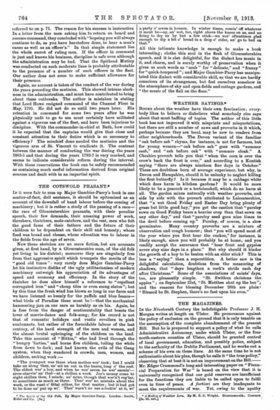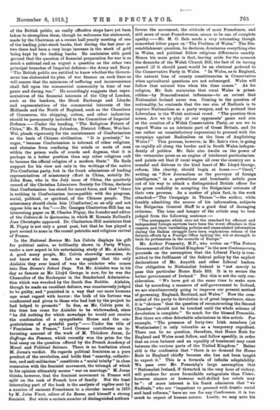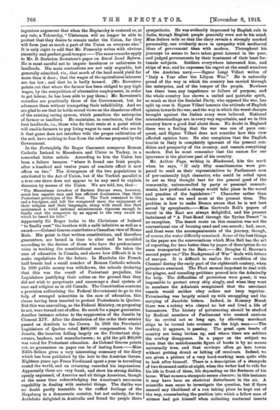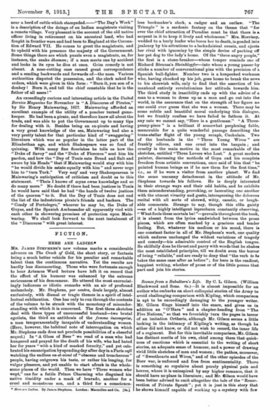THE MAGAZINES.
IN the Nineteenth Century the indefatigable Professor J. H. Morgan writes at length on Ulster. He pronounces against the policy of exclusion on the ground that it is only tenable on the assumption of the complete abandonment of the present Bill. But he is prepared to support a policy of what he calls Administrative Autonomy, under which Ulster, or the four north-eastern counties of Ulster, should be granted control of local government, education, and possibly police, subject to the authority of the Dublin Parliament, and he works out a scheme of his own on these lines. At the same time he is not enthusiastic about his plan, though he calls it "the true policy," observing that at best it is not an improvement on the Bill.— Mr. Edgar Crammond's long and interesting paper on " Finan-, cial Preparation for War" is based on the view that it is universally recognized that our gold reserves are insufficient for the functions they are liable to be called upon to fulfil even in time of peace. A fortiori are they inadequate to meet the requirements of war. Yet, owing to the apathy of the British public, no really effective steps have yet been taken to strengthen them, though he welcomes the statement, made by the Chairman at a recent half-yearly meeting of one of the leading joint-stock banks, that during the last year or two there had been a very large increase in the stock of gold being kept by the leading banks. He maintains with good ground that the question of financial preparation for war is as much a national and as urgent a question as the other two
principal branches of Imperial defence—the Army and Navy. .' The British public are entitled to know whether the Government has elaborated its plan of war finance on such lines as will ensure that the minimum of suffering and inconvenience shall fall upon the commercial community in time of war panic and during war." He accordingly suggests that representatives of the financial interests of the City of London, such as the bankers, the Stock Exchange and Lloyds,
and representatives of the commercial interests of the Midlands and the North of England, such as the Chambers of Commerce, the shipping, cotton, and other industries should be permanently included in the Committee of Imperial Defence.—Under the heading, "The Religious Future of China," Mr. R. Fleming Johnston, District Officer, Wei-haiWei, pleads vigorously for the maintenance of Confucianism as the basis of Chinese civilisation. "It is precisely," he urges, "because Confucianism is tolerant of other religions, and abstains from confining the minds or souls of men within the prison walls of creeds and dogmas, that it is perhaps in a better position than any other religious cult to become the official religion of a modern State." He finds support for his view not only in the writings of the native Pro-Confucian party, but in the frank admissions of leading representatives of missionary cffort in China, notably Dr. John Ross, who in the July issue of China, the quarterly record of the Christian Literature Society for China, declares' that Confucianism has stood for moral force, and that "there is nothing in Confucianism incompatible with the progress, social, political, or spiritual, of the Chinese people. The missionary should claim him [Confucius] as an ally and not oppose him as a foe."—Dr. Georges Chatterton-Hill has an interesting paper on M. Charles Peguy, the founder and editor of the Cahiers de la Quinzaine, in which M. Romain Rolland's Jean Christophe appeared. Dr. Chatterton-Hill maintains that M. Peguy is not only a great poet, but that he has played a part second to none in the recent patriotic and religious revival of France. In the National Review Mr. Ian Colvin displays his gift for political satire, so brilliantly shown in Party Whips, under a new aspect in his entertaining study of Mr. A islabie. A good many people, Mr. Colvin shrewdly surmises, do not know who he was. Let us suggest that the only Aislabie they ever beard of was the cricketer who comes into Toni, Brown's School Days. Yet Mr. Aislabie was in his day as famous as Mr. Lloyd George is now, for he was the Chancellor of the Exchequer in the Sunderland Administration which was wrecked by the South Sea Bubble. Aislabie, though he made an excellent defence, was unanimously judged to be guilty, and "punished in a way that our more humane age must regard with horror : the bulk of his fortune was confiscated and given to those who had lost by the project he had helped to promote." In fine, as Mr. Colvin puts it, the time has come for Aislabie to be whitewashed, since "he did nothing for which nowadays he would not receive the condonation of a sympathetic House and the congratulations of a grateful party." — Under the title of "Feminism in France," Lord Cromer contributes an interesting account of the work of M. Theodore Joran, Le Suffrage des Femmes, which recently won the prize for the best essay on the question offered by the French Academy of Moral and Political Science. There is no hesitation about M. Joran's verdict. He regards political feminism as a pure product of the revolution, and holds that "anarchy, collectivism, and anti-militarism" constitute a "social trinity" in close connexion with the feminist movement, the triumph of which in his opinion ultimately means "war on marriage." M. Joran thinks, however, that the feminist movement in France will split on the rock of French love of family. Not the least interesting part of the book is the analysis of replies sent by a number of eminent Frenchmen to a circular issued in 1910 by M. Jules Finot, editor of La Revue, and himself a strong feminist. But while a certain number of distinguished authors favour the movement, the attitude of most Frenchmen, and still more of most Frenchwomen, seems to be one of complete apathy.—Mr. M. 0. Sale sends a very interesting though somewhat bitter paper on " The Problem of Wales." The Disestablishment question, he declares, dominates everything else in Wales, and political follow religious differences exactly. Hence his main point is that, leaving aside for the moment the demerits of the Welsh Church Bill, the fact of its having passed (if it should pass) would be an electoral godsend to the Conservative Party in Wales. " In Wales, as in England, the natural bias of county constituencies is Conservative when agricultural questions are not submerged. Wales will follow that natural bias when the time conies." As for religion, Mr. Sale maintains that rural Wales is priestridden—by Nonconformist influences—to an extent that Nationalist Ireland never was. Coming to the question of nationality, he contends that the one aim of Radicals is to capture Nationalism as a party weapon, and to pretend that Liberalism is the Welsh national creed. " The question then arises, Are we to play at our opponents' game and aim at the creation of a Welsh Conservative Party, or are we to regard Wales as an intrinsic part of Great Britain, and (to use rather an unsatisfactory expression) to proceed with the campaign against Radicalism on the lines of Anglicizing Wales ? " This process, however, in Mr. Sale's view, is going on rapidly all along the border and in South Wales independently of politics. Mr. Sale also dwells on the power of the vernacular press as an engine of intolerant particularism and points out that if rural wages all over the country are a scandal and distress to the kind heart of Mr. Lloyd George, reform, like charity, should begin at home.—" Ceorl," writing on "New Journalism as the purveyor of foreign intelligence," in a pretentious and bombastic article goes out of his way to attack a distinguished British officer for his gross credulity in accepting the Bulgarians' estimate of their own prowess. As a matter of plain fact, in the work attacked—" The Campaign in Thrace "—the author, while frankly admitting the source of his information, subjects the Bulgarian General Staff to a good deal of damaging criticism. The tone and temper of the article may be best judged from the following sentence :—
"The newspapers which once set the standard for efficient and independent foreign services have been the worst offenders in this respect, and their vacillating policies and emasculated information during the Balkan struggle have been euphonious echoes of the fatuous efforts by a Foreign Office lacking the wit or strength to back its pretensions in the councils of Europe." Mr. Arthur Ponsonby, M.P., who writes on "The Future Government of the United Kingdom" in the new Contemporary, proceeds on the assumption that the Liberal Party is com mitted to the fulfilment of the federal policy by the explicit declarations of Mr. Asquith and other Liberal leaders. Our obligation to Nationalist Ireland is "not merely to pass this particular Home Rule Bill. It is to secure the better government of Ireland." But this is not the only consideration. "We have got at the same time to make sure that by according a measure of self-government to Ireland, we are simultaneously going to improve our present method
of governing England, Scotland, and Wales." Now the committal of the party to devolution is of great importance, since it is " obvious " that the question of reconstructing the Second Chamber "should not be touched until the whole scheme of devolution is complete." So much for the blessed Preamble. But there are other delectable admissions in this article. For
example, "The presence of forty-two Irish members [at Westminster] is only tolerable as a temporary expedient. There can be no question, therefore, that Home Rule for England and Wales must follow, and follow speedily, in order that an even balance and an equality of treatment may exist between the various parts of the United Kingdom." Better still is the confession that "there is no demand for Home Rule in England chiefly because she has not been taught to expect it." This is a formula of infinite adaptability. We pass over Mr. Ponsonby's large assumption that "Nationalist Ireland, if thwarted in the very hour of victory, will produce far more formidable antagonists than Ulster, however sincere or however well-drilled her rebels may be " : of more interest is his frank admission that "we Radicals," who are "impatient to proceed with drastic social and land reforms," have no use for any Conference, it is too much to expect of human nature. Lastly, we may note his ingenious argument that when the Heptarchy is restored or, at any rate, a Tctrarchy, " Ulstermen will no longer be able to protest that they desire to remain under the Union, for they will form just as much a part of the Union as everyone else." It is only right to add that Mr. Ponsonby writes with obvious sincerity and perfect good-temper.—The same remarks apply to Mr. B. Seebohm Rowntree's paper on Rural Land Reform. He is most careful not to impute harshness or unfairness to landlords. His main contentions are not only arguable, but generally admitted, viz., that much of the land could yield far more than it does ; that the wages of the agricultural labourer are too low ; and that he is badly housed. (Mr. Rowntree points out that where the farmer has been obliged to pay high wages, by the competition of alternative employment, in order to get labour, he has been able to pay them.) Mr. Rowntree's remedies are practically those of the Government, but he advances them without trumpeting their infallibility. And we are glad to see that he holds sound views on the disastrous effect of the existing rating system, which penalizes the enterprise of farmer or landlord. He maintains, in conclusion, that the best landlords, i.e., those who fix their rents at a point which
will enable farmers to pay living wages to men and who see to it that game does not interfere with the proper cultivation of the soil, have nothing to fear from the reforms proposed by the Government. In the Fortnightly Sir Roger Casement compares Roman Catholic Ireland to Macedonia and Ulster to Turkey, in a somewhat bitter article. According to him the Union has been a failure because "where it found one Irish people, after a hundred and twelve years of resolute effort it now offers us two." The divergence of the two populations is attributed to the Act of Union, but if the Turkish parallel is a true one there does not appear to be any need to explain disunion by means of the Union. We are told, too, that
" The Mussulman invaders of Eastern Europe were, however, much less capable men and less efficient dominators than their Protestant prototypes of the West. The Turk remained to the end a foreigner, and left the conquered races the enjoyment of their religion and their languages, along with much else that maintained a vivid national consciousness vigorous enough to finally oust the conqueror by an appeal to the very sword on which he based his title." Apparently Sir Roger looks to the Christians of Ireland "to finally oust" the heathen with a split infinitive as well as a sword.—Colonel Graves contributes a Canadian view of Home Rule. His point is that written constitutions, and therefore guarantees, are bound in time to alter and be moulded according to the desires of those who have the predominant voice in working the constitutional machine. He takes the case of education in Canada, and shows how difficult it is to make regulations for the future. In Manitoba the French half-breeds had a small number of Roman Catholic schools. In 1890 public money was withdrawn, the schools declaring that this was the result of Protestant prejudice, the Legislature justifying their action on the ground that they did not wish to perpetuate and encourage a dual system of race and religion as in old Canada. The Constitution contains a provision authorizing the Federal Government to go to the help of wronged minorities in the case of education, this clause having been inserted to protect Protestants in Quebec. But this was unavailing, as the Federal Ministry, on proposing to act, were turned out of office. So much for a paper guarantee. Another instance relates to the suppression of the Jesuits by Clement XIV. After the dissolution of the order their estates passed as derelicts to the Crown. In 1888 the Provincial Legislature of Quebec voted $400,000 compensation to the Jesuits, the taxation falling largely on the Protestant ship
owners, bankers, and manufacturers ; to gild the pill $60,000 was voted for Protestant education. As Colonel Graves points out, no guarantees on paper can be of lasting force.—Miss Edith Sellers gives a very interesting summary of the diary which has been published by the heir to the Austrian throne.
Eighteen years ago Franz Ferdinand spent a year in travelling round the world, and on returning recorded his impressions. Apparently these are very frank, and show his strong dislike, openly expressed, of America and all things American, though at the same time acknowledging the American's enormous capability in dealing with material things. The dislike was no doubt partly traceable to the ruffled feelings of the Hapsburg in a democratic country, but not entirely, for the Archduke delighted in Australia and found the people there
Isympathetic. He was evidently impressed by English rule in India, though English people generally were not to his mind. Miss Sellers tells us that the diary reveals a strongly marked personality, one evidently more in sympathy with mediaeval ideas of government than with modern. Throughout his journeys be seems to have taken great interest in the poor, and judged governments by their treatment of their least for tunate subjects. Soldiers everywhere interested him, and ships of war, and he expresses his regret at the small numbers of the Austrian navy.—Signor Luigi Villari writes of "Italy a Year after the Libyan War." He is naturally proud of the way in which his country has carried through the enterprise, and of the temper of the people. Nowhere has there been any impatience or failure of purpose, and the whole country has shown a united and patriotic spirit, so much so that the Socialist Party, who opposed the war, has split up over it. Signor Villari laments the attitude of English opinion towards the war, and the way in which the worst charges brought against the Italian army were believed. National misunderstandings are in every way regrettable, and we in this country know a good deal about them. No doubt in England there was a feeling that the war was one of pure con quest, and Signor Villari does not consider how this view affected opinion here. He also complains that the English
tourist in Italy is completely ignorant of the present condition and prosperity of the country, and resents everything modern. But he must remember that the excuse for our ignorance is the glorious past of his country. Mr. Arthur Page, writing in Blackwood, hits the mark when he says, "If only fifty constituencies were pre pared to send as their representatives to Parliament men of pre-eminently high character, who could be relied upon to act as they thought best for the general good of the Community, untrammelled by party or personal commit ments, how profound a change would take place in the moral and practice of the legislature ! " Character rather than brains is what we need most at the present time. The problem is how to make Demos aware that he is not best served by sycophants.—Miss Gertrude Bell's papers of travel in the East are always delightful, and the present instalment of "A Post-Road through the Syrian Desert" is no exception. The desert route on this occasion was not the conventional one of burning sand and sun-scorch ; hail, snow, and frost were the accompaniments of the journey, though, of course, the water difficulty remained. Some of the best things in the paper are the conversations which Miss Bell has the art of reporting, for here better than by pages of description do we seem transported to the East.—Mr. Douglas G. Browne's second paper on .f‘ The Background of War" deals with letters of marque. It is difficult to realize the condition of the Channel during the early part of the eighteenth century, when privateers swarmed. The Fleet seemed impotent to deal with the plague, and unending petitions poured into the Admiralty for help. The difficulties of protection were great; it was
impossible to protect every ship singly, and when they went in numbers the Admirals complained that the merchant vessels would neither obey orders nor keep together. Privateering was largely mixed up with smuggling and the carrying of Jacobite letters. Indeed, in Romney Marsh there was a colony who obeyed no law and lived a life of buccaneers. The history of privateering should be studied by Radical members of Parliament who seemed anxious for its revival not so long ago, by allowing merchant ships to be turned into cruisers on the high seas.—The cowboy, it appears, is passing. The great open tracts of country are being broken up, and where there are settlers the cowboy disappears. In a paper on the subject we learn that the melodramatic figure of books is by no means universally true, and that cowboys often go into towns without getting drunk or letting off revolvers. Indeed, we are given a picture of a very bard-working man, quite able to look after himself. There is a description of a stampede of two thousand cattle at night, when the writer had to ride for his life in front of them, life depending on the fleetness of his horse. What causes a stampede seems obscure ; in this instance it may have been an electrical disturbance in the air. A scientific man came to investigate the question, but if there seemed any likelihood of a run taking place he kept out of the way, remembering the position into which a fellow man of Science had got himself when collecting nocturnal insects
near a herd of cattle which stampeded.—" The Day's Work" is a description of the doings of an Indian magistrate visiting a remote village. Very pleasant is the account of the old native officer living in retirement on his ancestral land, who had fought in frontier wars and had been to England at the Coronation of Edward VII. He comes to greet the magistrate, and to uphold with his presence the majesty of the Government. Some things there are which puzzle even a magistrate, as, for instance, the snake dhaman; if a man meets one by accident and looks in its eyes he dies at once. Grim comedy is not absent. A nose-cutting case caused great correspondence and a sending backwards and forwards of—the nose. Various authorities disputed the possession, and the clerk asked for orders, which were given in this form : "Burn it, you son of a donkey ! Burn it, and tell the chief constable that he is the father of all asses ! "
An exceedingly curious and interesting article in the United Service Magazine for November is "A Discourse of Pirates," by Sir Henry Mainwaring, 1617. Mainwaring afforded an excellent example of the utility of a poacher turned gamekeeper. He had been a pirate, and therefore knew all about the trade, and was able to put the Government up to many tips for dealing with it. Besides being an ex-pirate and having a very great knowledge of the sea, Mainwaring had also a very pretty talent for that particular kind of "swaggering" literature which was so popular in the latter part of the Elizabethan age, and which Shakespeare was so fond of quizzing. With many fine flourishes he tells us how the "Duke of Savoy" and the "Duke of Florence" sent him his pardon, and how the " Dey of Tunis eate Bread and Salt and swore by his Heade " that if Mainwaring would stay with him "he would divide his estate equally with him" and never urge him to "turn Turk." Very naif and very Shakespearean is Mainwaring's anticipation of criticism and doubt as to this statement. "Theis I knowe of myne owne knowledge and so do many more." No doubt if there had been justices in Tunis he would have said that he had "the hands of twelve justices of the quorum" to it. But the Dey of Tunis does not end the list of the industrious pirate's friends and backers. The " Condy of Portolegro," whoever he may be, the Duke of Guyse, and the Spanish Ambassador all apparently vied with each other in showering promises of protection upon Mainwaring. We shall look forward to the next instalment of the " Discourse " with great interest.





















































 Previous page
Previous page